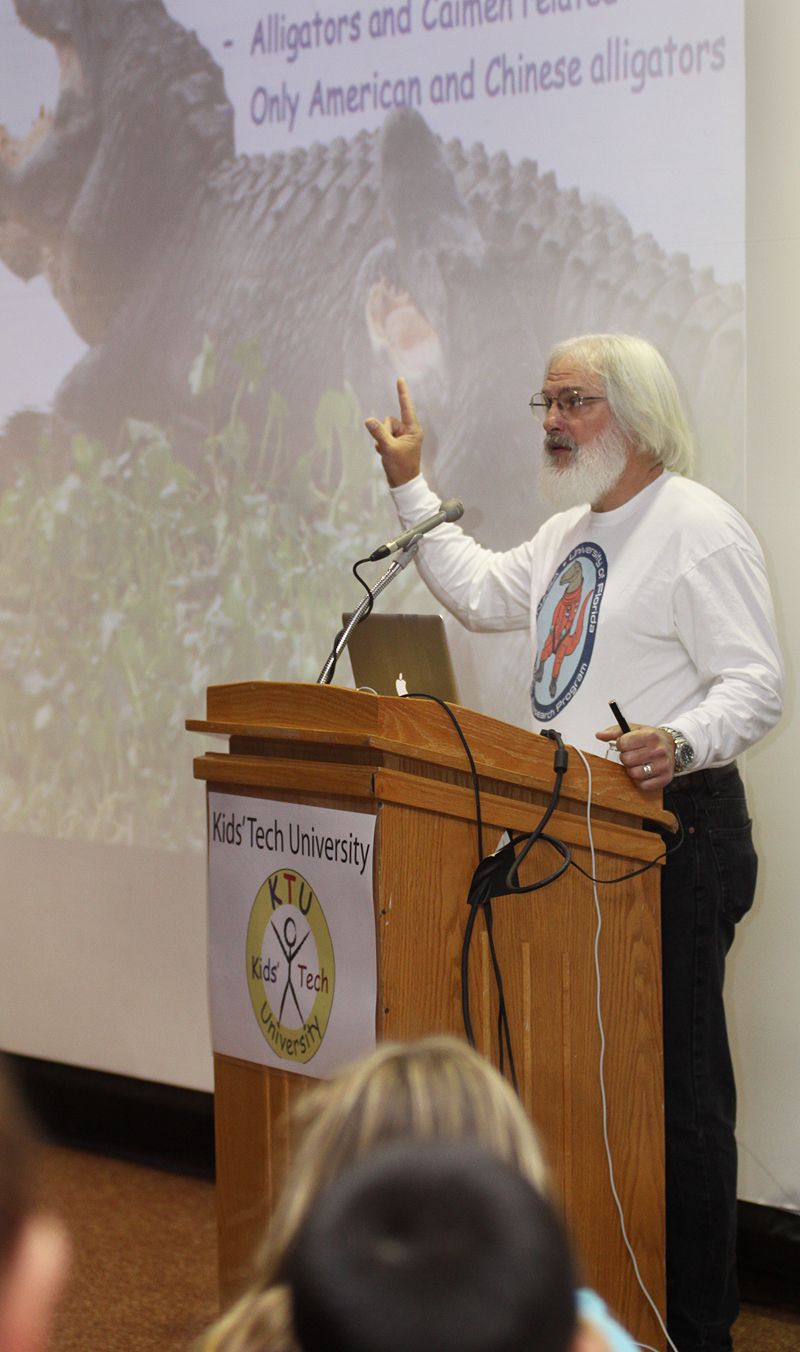Alligator man reveals the perils of plastic bottles to Kids' Tech University

The third installment of Kids' Tech University took place at the Colonial Hall in Virginia Tech's Squires Student Center on Saturday, March 28.
More than 400 children packed the lecture hall to listen to University of Florida reproductive biologist Louis J. Guillette explain why plastic bottles are bad for alligators.
The “alligator man,” as he is fondly known, revealed the detrimental effects that plastics can have on water ecosystems and the specific impact pollution is having on alligator populations in Florida. Parents were able to follow the lecture in a nearby auditorium to keep pace with their children and promote discussion at home.
Guillette explained to the children the ins and outs of how to identify an alligator and what it takes to go “alligator hunting.” His research team uses helicopters to go in search of alligators to measure the impact pollutants such as plastics are having on alligator birth rates. They often take alligators back to the lab for routine blood tests before releasing the animals back into the wild. This helps them build up a picture of how chemical pollutants are negatively impacting alligator populations in the wild.
Guillette said, “Americans use approximately two and a half million plastic bottles an hour. If you put that many average-sized plastic bottles end to end it would cover more than 7,000 miles in one day.” He added, “Plastics are the number one pollutant of the ocean and estimates suggest that more than 100,000 marine animals are dying every year due to this contamination of the environment.”
Guillette’s research has shown that some plastics contain chemicals that negatively impact the action of hormones important for reproduction in alligators. In some polluted lakes in Florida, the mortality rate of alligator embryos is as high as 50 percent. Around 80 percent of young alligators perished in one lake alone due to severe pollution. When they hatch from their eggs, alligators are also exposed to a wide range of chemical pollutants arising from human activities that may also lead to early death.
“Over the 20 years or so we have been doing this work, we have looked at around 100,000 alligator eggs and many animals in the wild,” said Guillette. “We are still heavily involved in unraveling the links between chemical pollutants and adverse effects on alligator populations. That’s an ongoing detective story.” Guillette added: “Plastics, like many chemicals, can also be good but we just have to work out how to use them wisely.”
The children had a lot of questions for the alligator man – from have you ever been hurt by an alligator, to how long do you think it would take for alligator populations to recover if the pollution problem were to be overcome. It turns out that alligator tails are just as dangerous as their bite and two to four generations (a couple of hundred years) might see alligator population levels recover to respectable levels.
Asked why he wanted to become an alligator biologist, Guillette replied: “As a child, the underwater television films of Jacques Cousteau inspired me. I have the best four jobs in the world combined into one – detective, adventurer, artist and storyteller. My job can be hard work, what with mosquitoes and the Florida weather in summer to contend with, but I would not have it any other way.”
Virginia Bioinformatics Institute and Virginia Tech Mathematics Professor Reinhard Laubenbacher, one of the founders and pioneers of Kids’ Tech University, commented: “I would like to thank the more than 70 volunteers from Virginia Tech who have helped to make this event a success.” In the afternoon, the kids took part in hands-on sessions at The Inn at Virginia Tech. The theme of the exhibitions was the "science discipline.”
The children were treated to a host of demonstrations by the Antarctic Geological Drilling (ANDRILL) Flexhibit, The Food Animal Practitioners Club, the Hahn Horticulture Garden at Virginia Tech, the Leadership Tech - Environmental Sustainability Group, Montgomery County Public Library, Montgomery and Giles County 4-H, Sigma Alpha, Sigma Gamma Epsilon, The Virginia Tech Amateur Radio Association, the Virginia Tech Dairy Science, the Virginia Tech Department of Fisheries and Wildlife Sciences, the Virginia Tech Department of Geosciences, the Virginia Tech Forestry Graduate Student Association, The Virginia Tech Microbiology club, the Virginia Tech Physics Outreach Program, the Virginia Tech School of Visual Arts, and many others.




